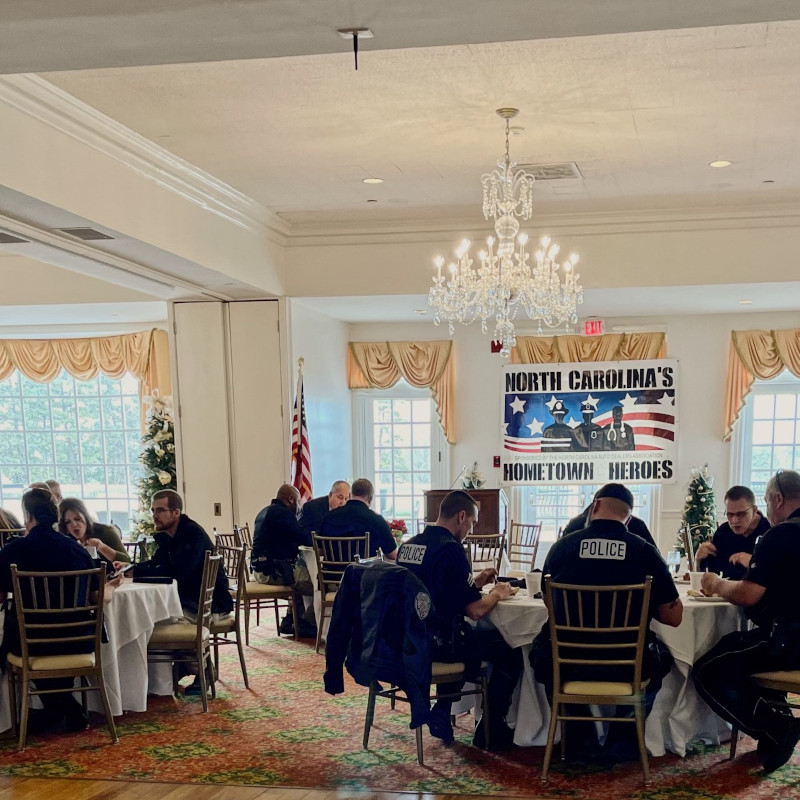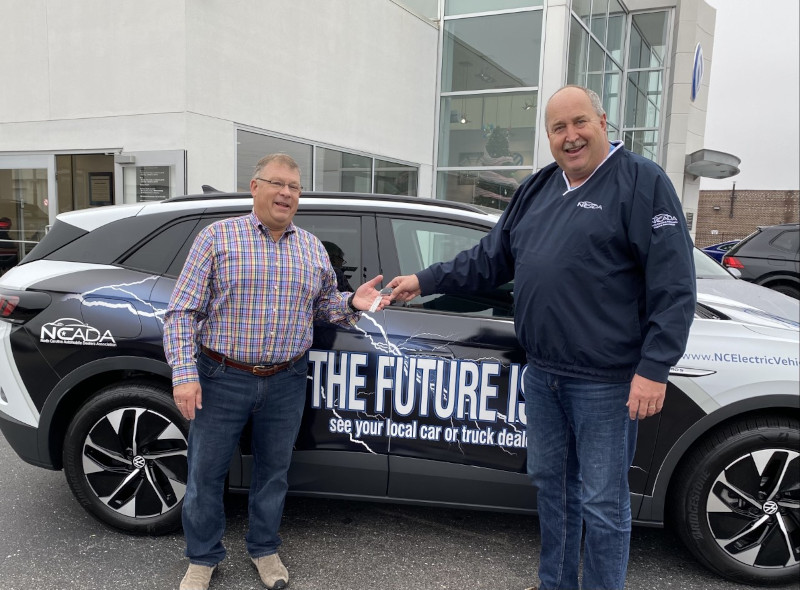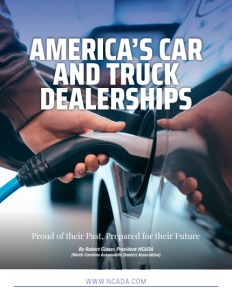AMERICA’S CAR AND TRUCK DEALERSHIPS
Proud of their Past, Prepared for their Future
By Robert Glaser, President NCADA (North Carolina Automobile Dealers Association)
Over the past two years, one industry across this nation has seen incredible, unprecedented changes and most certainly, will continue to be significantly impacted by unparalleled market changes in the years ahead. Franchised America’s Car And Truck Dealerships were not only impacted by the COVID-19 pandemic but were also buffeted by the confluence of new technologies, the Electric Vehicle (EV) revolution, market disruptors, and digital retailing.
Franchised new car and truck dealers have a long tradition of entrepreneurial prowess and have met challenges head-on over the past decades. Car and truck dealers, often spanning several generations within the same family, have survived the gas shortage of the 1970s, the Vietnam War, the threat of internet sales, 9/11, the War on Terror, the “Great Depression” of 2008-2009, bankruptcy of the leading vehicle manufacturers and, more recently, the impact of COVID with reduced face-to-face consumer sales. It is an industry that has faced adversity, adopted change, and survived over the past 100 years.
Today’s challenges provide incredible opportunities for both franchised car and truck dealers, as well as consumers who are purchasing new vehicles. Vehicles today are the safest, most environmentally friendly, longest lasting vehicles in the history of transportation. These vehicles present new and exciting opportunities for dealers, as well as consumers, in the years ahead. These are a few market trends that the consumer will see in the years ahead.
ONLINE DIGITAL DASHBOARD
With the replacement of analog dials, gauges, and push-button radio channels, tomorrow’s cars and trucks will feature heads-up displays, as well as a dashboard that more closely resembles an iPad or a Windows-based laptop. Additionally, vehicle manufacturers and select vendors will be able to download apps onto the “information center” that will not only pertain to the vehicle’s operations and services but will also address the driver’s personal habits, driving history, dining choices, recreational choices, and much more.
From an automotive perspective, the consumer will have the ability, with a few keystrokes, to download four-wheel drive features, or additional battery life, or additional gas saving features, etc. These products will be delivered on a “pay per use” basis with over-the-air updates as the vehicle sits in the consumer’s driveway.

COMING AGE OF ELECTRIC VEHICLES
Plug-in hybrids or full-battery electric vehicles will continue to gain acceptance by consumers in the next few years. While representing less than five percent of the marketplace in 2020, the sheer number of new EVs being introduced into the marketplace will accelerate consumer adoption. Vehicles will be equipped with easy-to-access charging station information that locates the nearest available charger as part of their informational dashboard – which will ease consumers’ range anxiety.
Today’s manufacturers have more than 80 new models of EVs and plug-in hybrids set for introduction in North America over the next five years. Additionally, the median range for EVs sold in 2021 is roughly 260 miles. This compares to an average range of only 90 miles in 2015. Advances in battery technology will continue to significantly benefit tomorrow’s EV drivers.
Even as new EV models are hitting the dealership showrooms, the average age of the vehicles on the road today is approaching 12 years old. Accordingly, the gas-powered vehicles and related gas stations will remain a common fixture on America’s highways, well into the next decade. Nonetheless, new technologies combined with advances in battery technology will firmly position EVs as a viable consumer option in the near future.
DEALERS WILL REMAIN A KEY PART OF THE CONSUMER TRANSACTION
For more than 30 percent of consumers, the purchase of a new vehicle represents one of the largest, and most complex, transaction in their lives. Challenges such as selling the current vehicle, transferring insurance, and registering the vehicle with the local tax department or DMV are all services that will continue to be offered by dealers as part of the transaction.
The local franchised dealership is the best trained, best equipped, and best prepared resource to assist consumers with the purchase and repair of tomorrow’s new EVs. In addition to the training, new equipment, and capital expenditures related to EVs, dealers will continue to competitively embrace and adopt digital processes that will allow consumers to complete many of the administrative tasks before setting foot in the dealership. These competitive practices will shorten the purchase time, reduce the purchase price, and allow the consumer to explore all features of their new vehicles or explore other vehicles within the dealership.
Likewise, while the advent of EVs may reduce the number of moving parts in tomorrow’s vehicles, there will still be a demand for vehicle services that will more closely resemble computer services than the age-old turning of wrenches. EVs will still require regular maintenance – more high-tech than in the past – that consumers will obtain from their local car or truck dealer.
DEALERSHIP CONSOLIDATION MAY IMPACT SMALLER COMMUNITIES
In many communities across North Carolina, the local new car and truck dealer is a pillar in the community’s philanthropic or charity spectrum. From supporting the local little league team, to sponsoring the nearby high school homecoming parades, dealers have long been ardent supporters of local community efforts.
However, as economies of scale make it more difficult to operate single, stand-alone dealerships, dealers are increasingly turning over their dealerships to larger, multi-franchise, multi-location dealership groups. The newly purchased dealership in the small community may not have the same affinity or connection with the community as the prior owner and, thus, may be less likely to continue to support community events. And, while the consumer will continue to receive cutting-edge automotive services, the local communities may be impacted by one less business to support local high schools, hospitals, civic groups, and youth sports.

A TRADITION OF SUCCESS SPANNING MULTIPLE GENERATIONS
As the business community and today’s entrepreneurs emerge from the tumultuous days of COVID-19 wrecking small businesses, local car and truck dealers are proactively working, as they have since the end of World War I, to explore new opportunities and new technologies for a better future. Dealers are proactively embracing digital transactions and the EV Revolution that will shape tomorrow’s automotive buying experience.
While Americans will continue to purchase vehicles from their local dealership, the details of the transactions and the type of vehicles on our nation’s highways will change in the years ahead. With a tradition that spans more than 100 years, tomorrow’s new car and truck dealers will remain an active, competitive, pro-consumer, pro-community industry – seeking and presenting new opportunities to better assist their customers.
Dealers have navigated major challenges in the past and their success and resiliency has been the foundation of the industry’s tradition. It’s a deeply rooted tradition, often spanning multiple generations of the same family, and one that has been tested and forged over the decades. Equally as important, it’s a tradition that is built on a commitment and common goal to proactively seek out and embrace tomorrow’s challenges and opportunities. The future looks good for America’s car, truck, and motorcycle dealers!
**Robert Glaser is the current President of the North Carolina Automobile Dealers Association representing North Carolina’s new car, truck and RV dealers across North Carolina. During his 26-year span at the Association, Glaser has initiated and coordinated the efforts of franchised dealers in programs such as the North Carolina Teacher of the Year Program, the Support our Troops program, the World War II Flight of Honor Program – flying 821 World War II vets to Washington, DC –and the current state-wide North Carolina Hometown Heroes Program, honoring more than 500 North Carolina First Responders.
Glaser is a graduate of the University of Dayton, as well as the University of Notre Dame’s US Chamber of Commerce Institute for Organizational Management program. He worked as a CPA in the Washington area for 5 five years before moving to North Carolina.
AT A GLANCE
North Carolina Automobile Dealers Association (NCADA)
What: Organization representing new car, truck, and RV dealers across North Carolina
Where: Based in Raleigh, North Carolina
Website: www.ncada.com



